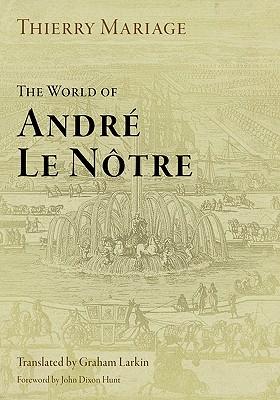The gardens of Versailles--along with the name of their chief creator, Andr Le Ntre (1613-1700)--have become synonymous with the French style of "formal" garden. This style in its turn would succumb to another "national" mode, the English school of naturalistic and picturesque landscapes. But as Thierry Mariage makes clear, the garden style that Le Ntre brought to perfection need not be seen in opposition to the later "English" one. Rather, he claims, they represent two points along a continuum that exists between the natural and cultural worlds.
Published originally in Belgium as L'univers de Le Nostre, Mariage's examination of Le Ntre moves beyond traditional art historical documentation and appreciation into a realm of interpretation. He situates Le Ntre's garden art in a complex social and cultural world, where the practices of land management, surveying techniques and hydrology, military practice, and both scientific and literary perspectives on land use and experience brought into being a unique form of landscape architecture. His analysis opens up the fashion in which design techniques and garden philosophy are shaped by material culture.
The gardens of Versailles--along with the name of their chief creator, Andr Le Ntre (1613-1700)--have become synonymous with the French style of "formal" garden. This style in its turn would succumb to another "national" mode, the English school of naturalistic and picturesque landscapes. But as Thierry Mariage makes clear, the garden style that Le Ntre brought to perfection need not be seen in opposition to the later "English" one. Rather, he claims, they represent two points along a continuum that exists between the natural and cultural worlds.
Published originally in Belgium as L'univers de Le Nostre, Mariage's examination of Le Ntre moves beyond traditional art historical documentation and appreciation into a realm of interpretation. He situates Le Ntre's garden art in a complex social and cultural world, where the practices of land management, surveying techniques and hydrology, military practice, and both scientific and literary perspectives on land use and experience brought into being a unique form of landscape architecture. His analysis opens up the fashion in which design techniques and garden philosophy are shaped by material culture.Paperback
$29.95